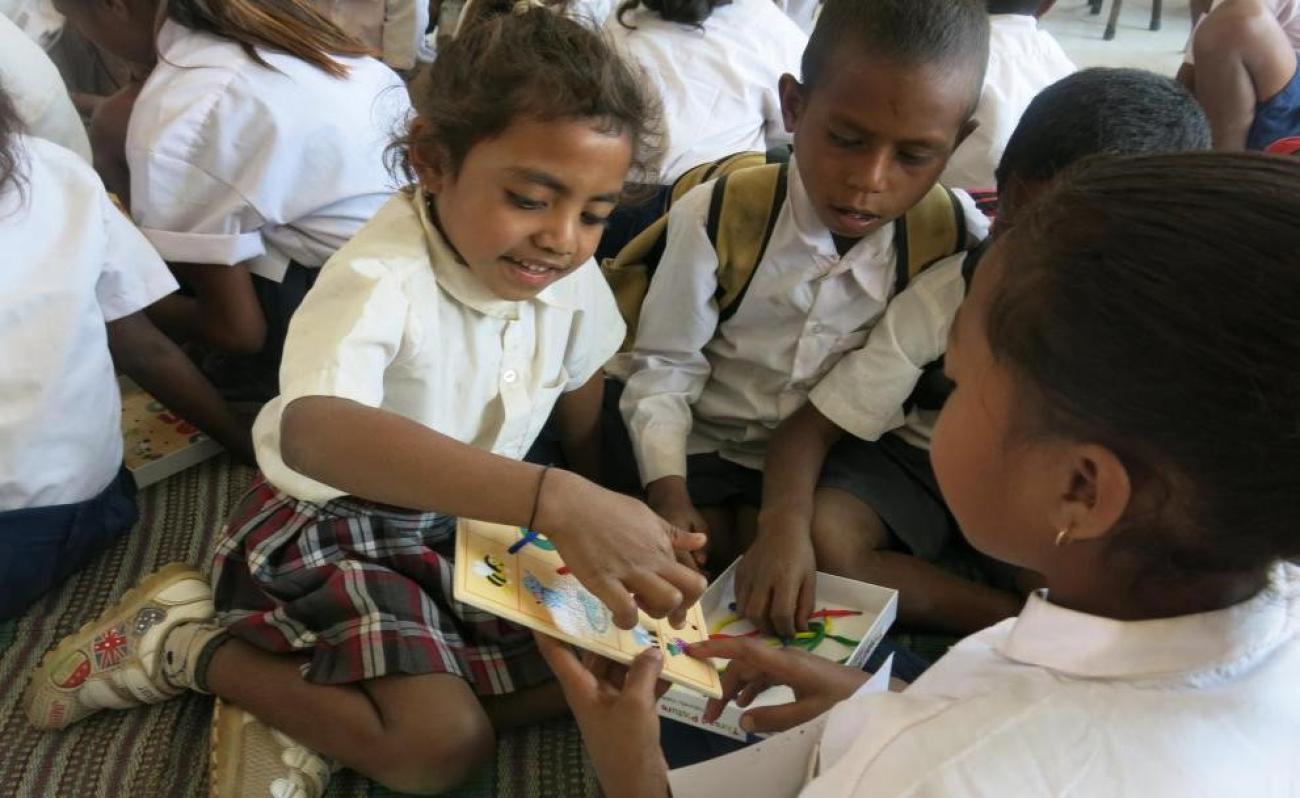Children in Grade 1 inspired to learn by peer mentors in Timor-Leste

Children in Grade 1 inspired to learn by peer mentors in Timor-Leste
Around forty children between the ages of five to seven sit in small groups on a large verandah and in classrooms at the Eskola Basic Filial (EBF) Matata school in Ermera Municipality. All of them are completely engrossed in books that they occasionally point to as they emphasize a detail or show each other some of the illustrations.
The setting is a school in the Ermera Municipality, where the UNICEF supported ‘Ready to LEAP’ (Learn, Engage, Achieve, Progress) programme, introduced in 2019 with the Ministry of Education, Youth and Sports, is helping children have a smooth transition from home to formal schooling. Similar activity is being conducted at ten other basic education schools in Ermera and Liquica municipalities.
The initiative helps children who enrolled in grade 1 or those repeating grade 1 to get additional support from the school, their parents, families and other students (peer mentors) to build up their confidence and prepare to continue learning in a school-based setting. Trained peer mentors play a key role in inspiring younger children to learn.
UNICEF Timor-Leste/2020/Dmaia
Grade 3 students involved as young mentors to Grade 1 students in EBF Matata, Ermera municipality.
In a country where only 27 per cent of children are enrolled in preschools, and where the grade 1 repetition rate is 19 per cent, initiatives such as these make a big difference in inspiring younger children to transition smoothly into school-based learning. To date, the school readiness programme has benefitted 1,314 students in grade 1 classes and enabled 439 students between 10 -11 years old from eleven basic education schools to take part in this initiative as peer mentors. So as not to interrupt learning for peer mentors, these sessions take place every Saturday.
The training for teachers and peer mentors at the school in Ermera was initially conducted in 2019 in collaboration with the Ministry of Education, Youth and Sports. However, the rollout of the programme was interrupted by COVID-19 related school closures. Most of the trained peer mentors from Grade 5 and Grade 6, who usually take part in this initiative, had also already graduated or were busy preparing for their final examinations.
However, the EBF Matata basic school introduced new ideas to keep the programme running. Teachers from EBF Matata school started engaging with Grade 2 and Grade 3 students who were once beneficiaries of the programme in 2019, to train and help them become peer mentors themselves and help inspire younger children to learn.
“I feel so happy and proud when the teacher asked me to be a young facilitator. Since joining this programme, I have become much closer to grade 1 students and have become friends with them” said 10-year-old Davio Bosco Cardoso

UNICEF Timor-Leste/2022/LRangel
A peer mentor takes part in an interview through phone call to help other children continue to learn.
Nine-year-old Merelia de Francia Mali Goncalves expressed her excitement at being part of the programme “I feel so proud because I am like a teacher for them, I make them feel happy, to be diligent, and they come to the school every day. So it is a great feeling,” she says.
At the beginning of the programme, teachers accompanied the peer mentors and supported them until the mentors were capable of running the activities on their own. As the programme progressed, teachers say the peer mentors got over their initial shyness and became more confident to speak up and lead the sessions.
“This is not only benefitting the Grade 1 students. After taking a role as peer mentors, the literacy and numeracy skills of the mentors also improved, and so did their social skills, for example, understanding ways to solve problems, or how to communicate with friends and manage time,” said Lurdes Rangel Goncalves, a teacher at the EBF Matata School in Ermera.
With additional funding from UNICEF Australia, the ‘Ready to LEAP’ programme will continue in 2022 and 2023 in 30 more schools in five municipalities. These would incorporate additional inclusive and sustainable approaches, including supporting the participation of children with disabilities.





